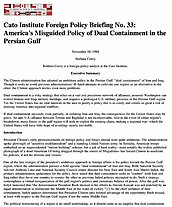The Clinton administration has adopted an ambitious policy in the Persian Gulf: “dual containment” of Iran and Iraq. Though it seeks to avoid previous administrations’ ill-fated attempts to cultivate one regime as an alternative to the other, the Clinton approach invites even more problems.
Dual containment is a risky strategy that relies on a vast and precarious network of alliances, assumes Washington can restrict Iranian and Iraqi military buildups, and requires a prolonged U.S. military presence in the Persian Gulf region. Yet the United States has no vital interests in the area to justify a policy that is so costly and entails so great a risk of drawing America into regional conflicts.
If dual containment succeeds, even partially, in isolating Iran and Iraq, the consequences for the United States may be grave. An anti‑U.S. alliance between Tehran and Baghdad is not inconceivable. And in the event of either regime’s breakdown, many forces in the gulf region will seek to exploit the ensuing chaos, making a regional war–which the United States will have little hope of avoiding–nearly inevitable.

This work is licensed under a Creative Commons Attribution-NonCommercial-ShareAlike 4.0 International License.
